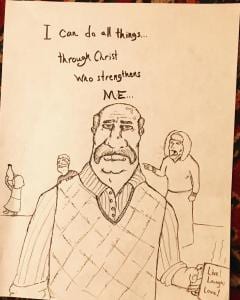I haven’t got a lot of time this morning because, well, we complicated everything by getting a kitten. So, here are two things for Thursday.
The First Thing
Apparently, people online are arguing again about David and Bathsheba, some people suggesting that David “assaulted” Bathsheba. I wrote about this two years ago (briefly) so I’ll just quote myself:
The text treats both of these women as
1. Human and
2. Adult
neither of which the current victim narrative allows. Bathsheba and Tamar are both caught in impossible and ugly situations, one leading to a lifetime of isolated mourning, and the other to murder and then the loss of a child. Tamar is overpowered physically by her own brother. Bathsheba gives into the desires of David the King. But they are not children. They are not ‘the widow and orphan’ who are treated with such just and tender care in the scripture. Nor are they are not faceless and nameless. They are fully human—complex, sinful—and fully grown up.Every age has been inclined to turn women into children. The purity culture has this sort of infantilizing effect on both men and women. Young People aren’t really capable of standing up and being human, of having agency, of making decisions, so let’s give them all these rules and tricks to help them along, so that they just won’t sin. The modern patriarchalism of places like the Vision Forum make women always children, prescribing their behavior and their very lives as if letting them think and act will ruin everything.
But the victim culture ends up in a similarly prescribed and narrow place. Why can’t Bathsheba be a complex, intelligent, sinful human person just like all other women? Why can’t she be caught in the same vortex of conflicting desires and motivations that complicate us all? That she could both desire her husband and desire to be with so powerful a man as the king? That she could choose the wrong thing and then hate herself? That she could be a jumble of thoughts and confusion that David absolutely took advantage of? But here’s the thing—we want to make the jumble of conflicting desires be something that makes her not responsible, that makes her almost, well, a child. Whereas the Bible doesn’t do that, because everyone—man and woman—has them.
I would just add also that, in the era of The Woman As Cheetah TM, that you still can’t have it both ways, however hard you try. The woman who devotes herself to herself is going to be a devouring person, a person who destroys other people’s lives. The internal contradiction–all women are victims and yet they also have some Cheetah essence deep down that they need to access through their own rage–is the driving force of The Book of Longings which I am still plodding through. Verily verily I say unto you, I find the whole thing terribly depressing.
The Second Thing
While I was rushing around yesterday I listened to this whole thing. It’s Justin Brierley talking to NT Wright and Douglas Murray about the depressing lack of any “storied” myth for modern people, and what Christians should do about it. Wright, who is so articulate as usual, nevertheless fails to satisfy Murray’s plea that Christians be who they are, and believe what they ought to believe. Wright says that’s not fair, of course Christians believe what they ought to believe, and the way you can know that it’s fine is by all the good works they are doing. Nevertheless, when Murray asks, essentially, ‘but what about forgiveness, the very heart of the Christian life, and the foundation of western civilization,’ Wright starts talking about Desmond Tutu.
I think I saw a while ago some Christians complaining that so many other Christians are listening to people like James Lindsey and some of the other new atheists. They shouldn’t do that, so says some of those Christians. They should all listen to other Christians who are not atheists. The problem, of course, is that those other Christians are more and more embracing ideological positions that render the scriptures and the gospel not only powerless but largely incomprehensible. Whereas, Lindsey and Murray and even Jordan Peterson seem to more fully grasp the implications and weight of the Christian gospel and scriptures, and are able to see what so many Christians themselves are throwing away–even though they themselves don’t believe it.
At the end of the interview, Brierley asked Murray if he wished all the stuff about Jesus were true and Murray, without pausing, said, “Of course I do, of course I want it to be true.” That, I think, is the nutshell. Many people today who claim to be Christian don’t want the gospel to be true. They would rather have the less embarrassing human empowerment, human self-flagellation gospel be true. They don’t want the radical and miraculous forgiveness of Jesus wrought in his own blood, vindicated by his resurrection to be the thing that orders not just all our steps, but the very cosmos. They would rather have self-enacted social justice. Tragically, to my ear, Murray’s description of forgiveness and the Christian story sounded more Christian to me than Wright’s. I feel like Alice in Wonderland, looking for a way back to sanity.
Have a great day! Don’t know if I’ll be blogging tomorrow as that day is even more complicated than this one.

















